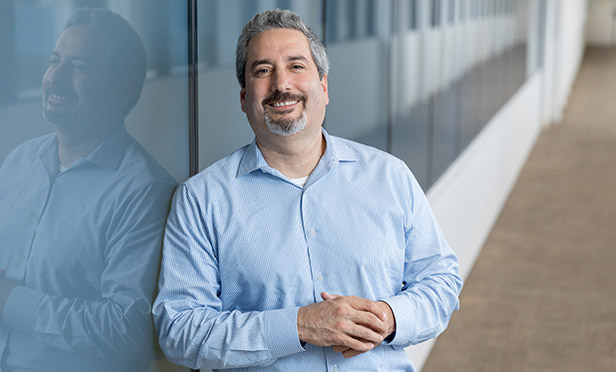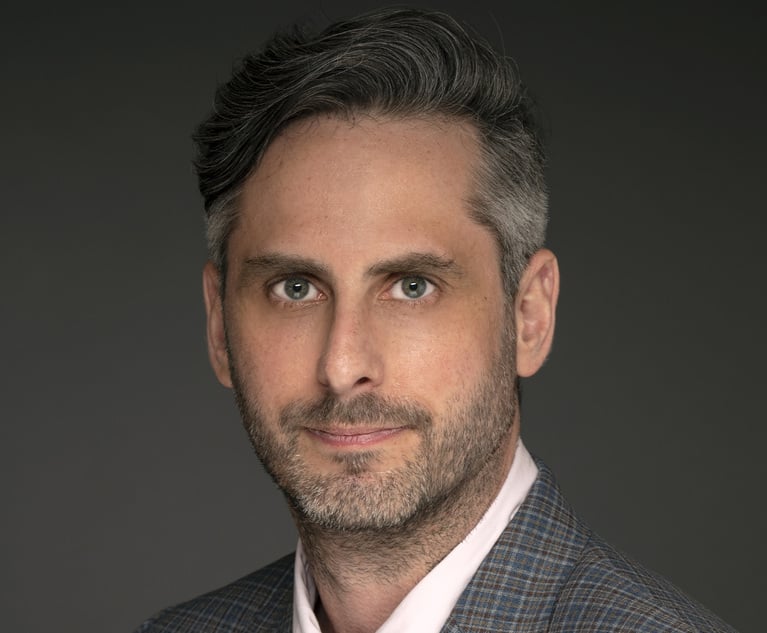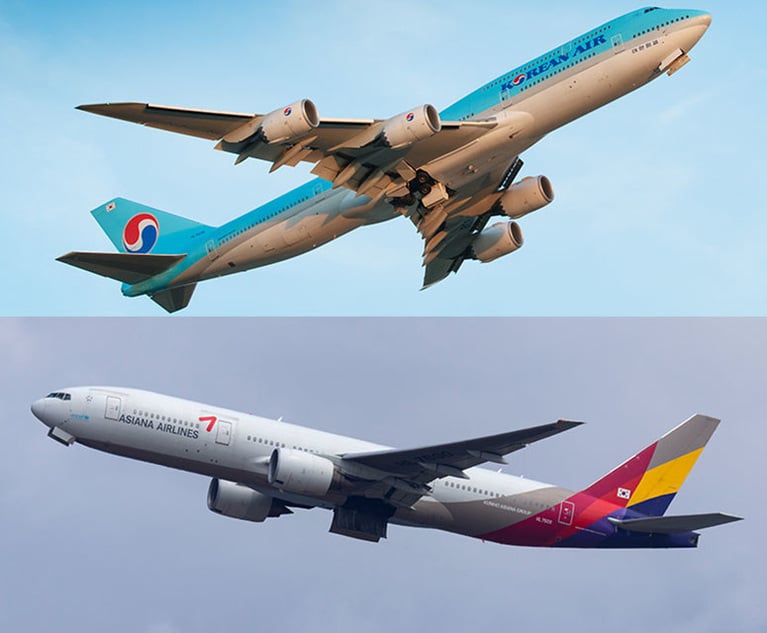In-House Impact Award: Patrick Bombach, Intel
Being a deal lawyer in-house at Intel Corp. means no shortage of work. This past year Patrick Bombach played central roles in the company's $16.7…
November 15, 2017 at 06:30 PM
4 minute read

Photo: Jason Doiy/ALM
Being a deal lawyer in-house at Intel Corp. means no shortage of work. This past year Patrick Bombach played central roles in the company's $16.7 billion acquisition of Altera, the $4.2 billion spinout Intel Security into the newly re-formed McAfee and, most recently, its $15.3 billion acquisition of Mobileye, signaling Intel as a serious player in the autonomous car race.
Bombach recently told The Recorder about Intel's “hands-on” approach to working with outside counsel on transactions.
Would you say there's an Intel way of approaching a transaction, or is each deal approached as a singular exercise? Each deal as a matter of course is unique, but our overall philosophy entering into a potential transaction is to think about what we want and why and how to accomplish our goals in a manner that is best for Intel and its stockholders.
My expectation for our M&A team is that each member fully understands each and every issue, both business and legal, to achieve optimal outcomes for Intel. We have to be much more than lawyers.
Do you have a philosophy on what sorts of matters should go to outside counsel and what should be handled internally on any given deal? Does the volume of deals the company has going at any given time change that mix? Our team is extremely “hands-on” … perhaps to the consternation of our outside counsel. In all seriousness, it is impossible for outside counsel to understand what is going on behind the curtain, and it is our team's responsibility to drive projects forward.
That being said, we work closely with our outside counsel and expect our firms to understand our business and approach. We work with a few firms and hold them to high standards, but we view them as valued, long-term business partners. We believe this approach allows our outside counsel to provide exceptional service and helps us achieve better results.
How would you describe your role personally on each of these three deals? What were your chief responsibilities on each? My principal role at Intel evolved over the course of these three transactions from associate director, acting as an individual contributor, to group counsel, managing M&A Legal, to managing director, managing all of Intel capital legal.
I went from being “in the weeds” day-to-day to advising our executives on strategic decisions (yet somehow still “in the weeds”). However, I've always viewed my chief responsibility as setting our team up for success. I try to empower them to make decisions, remove obstacles within the broader organization and take responsibility when things don't go as planned. Moreover, I strive to give my team credit and exposure for their hard work, and I would be remiss not to mention Benjamin Olson and David Miscia for their roles on McAfee and Mobileye, respectively. In my eyes, this is a team award.
What were the key legal challenges to disentangling Intel Security from the large company and rolling it out into its own business while still maintaining a significant stake in the new McAfee? As you can imagine, it is incredibly difficult to separate a fully-integrated, global, billion-dollar business from a corporation such as Intel. The challenges ran the gamut—IP, tax, employment, IT, supply-chain, finance, contracts, corporate, jurisdictional, compliance, regulatory. But in the end, the team was able to pull together the people and technology on time and on target to help create one of the largest pure-play, cybersecurity companies in the industry.
The Mobileye transaction clearly signaled to the market that Intel will be a serious player in the autonomous vehicle space. How much does the regulatory and competitive environment in that nascent industry affect the work M&A lawyers do on a deal like this one? The Mobileye transaction is exciting for all of Intel. Not only is it a tremendous growth opportunity for our business, but autonomous vehicles have the potential to transform society and save countless lives.
Because the industry is still in its infancy, we understood that there would be risks that are not easily quantified and that we would need to look beyond the standard due diligence checklist. Completing the deal required us to see the world 10 to 15 years out and understand Intel's place in that world. It goes back to what I mentioned before—at Intel Capital Legal, we believe that we have to be much more than lawyers to succeed.
This content has been archived. It is available through our partners, LexisNexis® and Bloomberg Law.
To view this content, please continue to their sites.
Not a Lexis Subscriber?
Subscribe Now
Not a Bloomberg Law Subscriber?
Subscribe Now
NOT FOR REPRINT
© 2025 ALM Global, LLC, All Rights Reserved. Request academic re-use from www.copyright.com. All other uses, submit a request to [email protected]. For more information visit Asset & Logo Licensing.
You Might Like
View All
Polsinelli Picks Up Corporate Health Care Partner From Greenberg Traurig in LA

Navigating Twitter's 'Rocky Deal Process' Helped Drive Simpson Thacher's Tech and Telecom Practice

How the Deal Got Done: Sidley Austin and NWSL Angel City Football Club/Iger

O'Melveny Secures Global Clearances for Korean Air-Asiana Merger
Trending Stories
- 1Uber Files RICO Suit Against Plaintiff-Side Firms Alleging Fraudulent Injury Claims
- 2The Law Firm Disrupted: Scrutinizing the Elephant More Than the Mouse
- 3Inherent Diminished Value Damages Unavailable to 3rd-Party Claimants, Court Says
- 4Pa. Defense Firm Sued by Client Over Ex-Eagles Player's $43.5M Med Mal Win
- 5Losses Mount at Morris Manning, but Departing Ex-Chair Stays Bullish About His Old Firm's Future
Who Got The Work
J. Brugh Lower of Gibbons has entered an appearance for industrial equipment supplier Devco Corporation in a pending trademark infringement lawsuit. The suit, accusing the defendant of selling knock-off Graco products, was filed Dec. 18 in New Jersey District Court by Rivkin Radler on behalf of Graco Inc. and Graco Minnesota. The case, assigned to U.S. District Judge Zahid N. Quraishi, is 3:24-cv-11294, Graco Inc. et al v. Devco Corporation.
Who Got The Work
Rebecca Maller-Stein and Kent A. Yalowitz of Arnold & Porter Kaye Scholer have entered their appearances for Hanaco Venture Capital and its executives, Lior Prosor and David Frankel, in a pending securities lawsuit. The action, filed on Dec. 24 in New York Southern District Court by Zell, Aron & Co. on behalf of Goldeneye Advisors, accuses the defendants of negligently and fraudulently managing the plaintiff's $1 million investment. The case, assigned to U.S. District Judge Vernon S. Broderick, is 1:24-cv-09918, Goldeneye Advisors, LLC v. Hanaco Venture Capital, Ltd. et al.
Who Got The Work
Attorneys from A&O Shearman has stepped in as defense counsel for Toronto-Dominion Bank and other defendants in a pending securities class action. The suit, filed Dec. 11 in New York Southern District Court by Bleichmar Fonti & Auld, accuses the defendants of concealing the bank's 'pervasive' deficiencies in regards to its compliance with the Bank Secrecy Act and the quality of its anti-money laundering controls. The case, assigned to U.S. District Judge Arun Subramanian, is 1:24-cv-09445, Gonzalez v. The Toronto-Dominion Bank et al.
Who Got The Work
Crown Castle International, a Pennsylvania company providing shared communications infrastructure, has turned to Luke D. Wolf of Gordon Rees Scully Mansukhani to fend off a pending breach-of-contract lawsuit. The court action, filed Nov. 25 in Michigan Eastern District Court by Hooper Hathaway PC on behalf of The Town Residences LLC, accuses Crown Castle of failing to transfer approximately $30,000 in utility payments from T-Mobile in breach of a roof-top lease and assignment agreement. The case, assigned to U.S. District Judge Susan K. Declercq, is 2:24-cv-13131, The Town Residences LLC v. T-Mobile US, Inc. et al.
Who Got The Work
Wilfred P. Coronato and Daniel M. Schwartz of McCarter & English have stepped in as defense counsel to Electrolux Home Products Inc. in a pending product liability lawsuit. The court action, filed Nov. 26 in New York Eastern District Court by Poulos Lopiccolo PC and Nagel Rice LLP on behalf of David Stern, alleges that the defendant's refrigerators’ drawers and shelving repeatedly break and fall apart within months after purchase. The case, assigned to U.S. District Judge Joan M. Azrack, is 2:24-cv-08204, Stern v. Electrolux Home Products, Inc.
Featured Firms
Law Offices of Gary Martin Hays & Associates, P.C.
(470) 294-1674
Law Offices of Mark E. Salomone
(857) 444-6468
Smith & Hassler
(713) 739-1250






